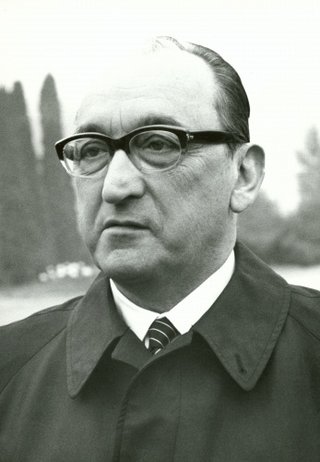Dr. Alfred Maleta

Personalia
Born:
Died:
Profession:
Persecution:
Imprisonment 13.03.1938 - 03.06.1938,
Dachau concentration camp 03.06.1938 - fall 1939,
Flossenbürg concentration camp, fall 1939 - 1940,
Dachau concentration camp 1940 - 12.11.1940
Honors:
Grand Decoration of Honor in Gold for Services to the Republic of Austria
Grand Cross of the Order of Merit of the Federal Republic of Germany
Decoration of Honor in Gold of the Province of Upper Austria
Professional title Professor
Honorary citizen of Vienna
Memberships
Curriculum Vitae
After the family moved from Vienna in 1920, Alfred Maleta attended the Akademisches Gymnasium in Linz. In 1922, he joins the secondary school fraternity Nibelungia Linz. After graduating from high school, Alfred Maleta went to Graz in 1927 to study law. He joins the student fraternity Carolina there in 1927. In 1932, he graduated with a doctorate in law and left Graz to complete his judicial year.
As his efforts to join the state civil service were unsuccessful, he accepted an offer as deputy and then managing director of the Vaterländische Front in Upper Austria. He later became secretary (chamber office director) of the Chamber for Workers and Employees in Upper Austria and executive secretary of the provincial cartel of the Federation of Trade Unions.
After the occupation of Austria by Hitler's Germany, Alfred Maleta was arrested by the SS in Linz on March 13, 1938. He is sent to Dachau concentration camp with the third transport of Austrians on June 3, 1938. His love for his fraternity is so great that, together with his fraternity brothers Josef Aigner, Walter Nestor and Friedrich Funder held a "Festkommers" in the canteen of the concentration camp on August 18, 1938, unnoticed by the guards and other prisoners, to mark the 50th anniversary of the founding of the Carolina. He ends the "Kommers" with the words "Austria erit in orbe ultima."
In the fall of 1939, he is transferred to Flossenbürg concentration camp, transferred back to Dachau in 1940 and released to Graz on November 12, 1940, but has to report to the Gestapo every three days. While in prison, he plans the re-establishment of the Second Republic together with other imprisoned Social Democrats. Soon after his release, he was drafted into the mountain troops and deployed on the Eastern Front.
After Austria's liberation, Alfred Maleta was appointed deputy head of the Upper Austrian regional employment office and soon afterwards was transferred to the Ministry of Social Affairs, where he remained until his retirement, most recently as section head. He joins the ÖVP-Kameradschaft der politisch Verfolgten und Bekenner für Österreich. He is a well-known and respected politician, including as General Secretary of the ÖVP (1951-1960), as a member of the National Council (1945-1975) and as President of the National Council (1962-1970) and Vice-President (1970-1975). In 1981, he was made an honorary citizen of the city of Vienna.
He died in Salzburg at the age of 84 and was laid to rest at Vienna's Central Cemetery.
Places
Persecution:
Residence:
Multimedia
Citations
Krause, Peter/Reinelt, Herbert/Schmitt, Helmut (2020): Farbe tragen, Farbe bekennen. Katholische Korporierte in Widerstand und Verfolgung. Teil 2. Kuhl, Manfred (ÖVfStG, Wien) S. 210/211.
